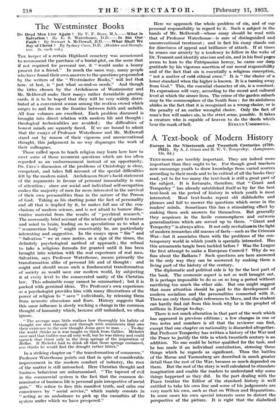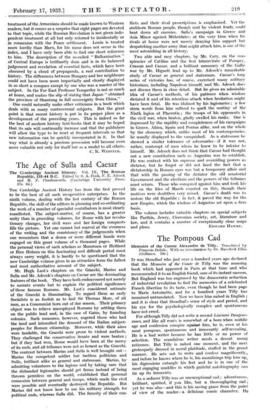A Text-book of Modern History
TEXT-BOOKS are terribly important. They are indeed more important than they ought to be. For though good teachers now encourage youth to draw knowledge from varied sources according to their needs and to be critical of all the books they read, yet to far too many the text-book is still a great part of the subject. It is fortunate, therefore, that "Grant and Temperley " has already established itself as by far the best text-book on the period of history in which youth is most interested. ' Most text-books repeat old shibboleths and phrases and fail to answer the questions which occur in the readers' minds. Sometimes this has a stimulating effect by making them seek answers for themselves. But generally they acquiesce in the facile commonplaces and outworn generalizations which are served up to them. "Grant and Temperley " is always alive. It not only revitalizerin the-light of modern researches old masses of facts—such as the Crimean War—but it associates them with the problems of the con- temporary world in which youth is specially interested. Has this armaments tangle been tackled before ? Was the League the first attempt to make a European Council ? Why do we fuss about the Balkans ? Such questions are here answered in the only way they can be answered by making them a living part of the history of the century.
The diplomatic and political side is by far the best part of the book. The economic aspect is not so well brought out. It is perhaps impossible to do so on so long a period without sacrificing too much the other side. But one might suggest that more attention should be paid to the development of modern socialism and the personalities connected with it. There are only three slight references to Marx, and the student can hardly find out from this book why he is the prophet of millions in Europe to-day.
There is not much alteration in that part of the work which has appeared in previous editions ; a few changes in one or two notes and numbers is all that the reviewer can find, except that one chapter on nationality is discarded altogether. But Professor Ternperley has written a history of the War and the Peace to justify the title in which twentieth century is an addition. No one could be better qualified for the task, and he has made it an individual contribution, stressing those things which he regards as significant. Thus the battles of the Manse and Tannenberg are described in much greater detail than the rest of the War, because so much depended on them. But the rest of the story is well calculated to stimulate imagination and enable the readers to understand why some things happened as they did. In the part dealing with the Peace treaties the Editor of the standard history is well entitled to take his own line and some of his judgements are very much his own, such as that on Wilson and Reparations. In some cases his own special interests seem to distort the perspective of the picture. It is right that • the diabolical treatment of the Armenians should be made known to Western readers; but it comes as a surprise that eight pages are devoted to that topic, while the Russian Revolution is not given inde- pendent treatment at all but only referred to incidentally or in connexion with the Peace settlement. Lenin is treated more hardly than Marx, for his name does not occur in the index, and I have only been able to find one short reference to him. The description of the so-called " Balkanization " of Central Europe is brilliantly done and is in its balanced judgement and revelation of essential facts, which have been obscured by a cloud of propaganda, a real contribution to history. The differences between Hungary and her neighbours could not have been more impartially and clearly displayed in so short a compass except by one who was a master of the subject. In the Far East Professor Temperley is not so much at home, and makes the slip of stating that Japan " obtained the province of Shantung in tall sovereignty from China.".
One could naturally make other criticisms in a book which deals with so many controversial subjects. But the great point is that recent history is put in its proper place us a development of the preceding years. This is indeed so far the best of modern history text-books that it may be hoped that its sale will continually increase and that the publishers will allow the type to be reset at frequent intervals so that new information can be quickly incorporated in it. In that way what is already a precious possession will become even more valuable not only for itself but as a model to all others.
C. K. WEBSTER.







































 Previous page
Previous page